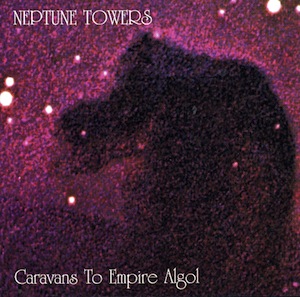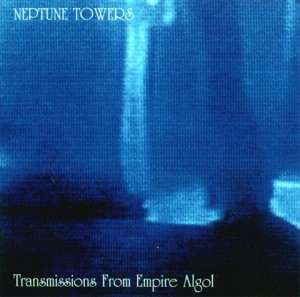Side projects and solo albums from artists in established bands can appear for a number of reasons. They can allow an artist to satisfy hitherto side-lined creative impulse (James La Brie), they can offer an outlet when a band is on hiatus (Jerry Cantrell) and they can also offer a total departure from the day job (Shagrath in Chrome Division). Whatever the motivation, the results can be patchy, with the music transpiring to be a somewhat lacklustre take on the artist in question’s main outfit (Emigrate being a prime example), or simply lacking in quality control (take a bow Scott Weiland), and these side projects can often find themselves relegated to the ‘completist only’ section of an artist’s career. Neptune Towers is an oddity in that it doesn’t really fit anywhere in the above description. Certainly it is unrecognisable as the work of Fenriz, one of the founders of seminal black metal outfit Darkthrone, so much so that even Darkthrone completists may not wish to add it to their sacred collection and yet the music, for what it is, is really very good, and it is guaranteed to pique the interest of anyone with a penchant for the woozy synth sounds of seventies progressive music .
Fenriz, it turns out, was (and still is, one presumes) fascinated by space. As a teen, the handy liner notes on debut album ‘Caravans to empire Algol’ inform us, Fenriz would track down anything and everything about space, from the trippy tunes of Uriah Heep to library books that the young Fenriz would endeavour to hand copy so that he could keep the images even after the book had been returned. Fatefully an older Fenriz, about to play a Darkthrone gig, went off on a mission to a local record shop in search of spacey music to fuel his imagination and came across the work of Klaus Schulze, a German electronic music composer who had briefly dallied with Tangerine Dream before going solo to produce well over sixty albums over the course of his lengthy and varied career. It was 1975’s ‘Timewind’ that grabbed young Fenriz with its fantastic cover (see above) and from that moment on Fenriz became hooked on the dark possibilities of synth music and a genre that would eventually become known as ambient.
‘Caravans to empire Algol’ is a massive, spacey, unique voyage. Sporting only two tracks (the title track, clocking in at some 24 minutes and ‘The arrival at Empire Algol’) it is a hypnotic, undulating trip that stands apart from the lo-fi aural assault of Fenriz’s day-job. The sound is warm, lush even, which is remarkable given the whole thing was basically pieced together on a four-track recorder set up in a living room. What really sets this musical work apart, however, is the vision of its creator. Fenriz crafted a sci-fi epic by feel alone, deconstructing and then reassembling Klaus’ work, whilst simultaneously developing his understanding of what the synth could do, piecing together ideas that would fuel not one, but two albums (‘Transmissions from Empire Algol’ was already conceived even as ‘caravans to…’ was being developed. The result is an album that might serve fans of Darkthrone as a curiosity, but which is far more suited to fans of the eccentric work of Fripp and Eno (‘no pussyfooting’) or Pink Floyd’s ‘Ummagumma’. Such an artistic departure is rare indeed, and yet Fenriz embraced the feel and spirit of his childhood passion to the extent that the album leaves you feeling quite literally spaced out and the warning on the sleeve that this music is “not for communal listening” is entirely apt – this is an album best appreciated in solicitude, either played extremely loud through a stereo, or blasted into headphones so that you end up a drift in a sonic isolation tank that fuels the imagination rather than mapping out your every thought for you.
Whilst ‘Caravans to Empire Algol’ remains intact, Peaceville choosing to add liner notes only to the reissue, ‘Transmissions from Empire Algol’ dispenses with the notes (after all, what more is there to say?)but adds a bonus track in the form of ‘excerpts from ‘Space lab’ (1994)’, an aborted follow up to the twin ‘Algol’ set. ‘Transmissions…’, as noted in the previous paragraph, is a direct continuation of the series and, ideally, the albums need to be heard together for the listener to get maximum benefit from the project. As with its predecessor, the music is hypnotic, awash with alien sounds and lush soundscapes. Drums and vocals are both absent as these, apparently, tether the audience to the ground, whereas the whole purpose of the project is to send the listener up into orbit from where they can gaze at the stars and nebulae unfolding before them. Whatever the motivation, it works – few pieces of contemporary work can be this startlingly innovative – and while this is very much a mood piece to be played only at select times, this is a genuinely progressive work that will appeal to a diverse cross-section of music fans ranging from curious Darkthrone aficionados to ambient and progressive fans searching for something genuinely new and exciting to fuel their ever-expanding consciousness. Once again comprising two tracks (ignoring the bonus tracks for the time being), the album opens with the organ-laden grandeur of ‘first communion. Mode: Direct’ which lasts a mind-bending 23 minutes and covers a variety of sonic territory from undulating synth washes to snippets of classical organ shot through the darkness. ‘To cold Void Desolation’, on the other hand, is a shorter piece (a mere 12 minutes) that throbs with action. Where the first track meanders gently, the sense of movement and return is palpable, and you can feel the adrenalin surge as the track brings you racing back towards earth.
With regards to the bonus tracks, ‘Space lab’ was the album that never made it. Just as those first two records were fuelled by an irrepressible fervour, so ‘Space lab’ failed to generate that same sense of excitement in Fenriz. You can feel the change. The tracks are most certainly a worthwhile addition to the set (and gold dust for long-time fans aching to hear more of a long-aborted project) but you can see that Fenriz’s heart just was no longer in the project and to release it would have been altogether too much of a good thing. Very sensibly the project was shelved and Fenriz, having moved away from ambient altogether, got back to the business of desecrating hearts and minds with Darkthrone leaving the Neptune Towers audience with two very good, very individual records as a souvenir of his excursions to another planet.
It was sensible to name the project Neptune Towers thus disassociating it from both Fenriz and Darkthrone as such. The music here is utterly removed from the frosted guitars and hell-torn vocals of Darkthrone and thus should be viewed as a different entity altogether. This is a project borne of passion. Fenriz’s guiding hand takes you on a journey that passes through his understanding of space and leaves you up there in the darkness, not isolated and frozen in an empty void, but gazing out in rapt wonder at the vast star fields witnessing the birth and collapse of stars and the swirling mysteries of far-flung galaxies. This may sound fantastic, but all music is about fuelling the emotions and, of course, the more open the sonic template, the more open to interpretation the music is. With no vocals or discernible rhythms to ground you, this is an epic trip that is only loosely guided by your host, and the result is a magnificent, progressive soundscape that will appeal to fans of Steven Wilson’s work with Bass communion, drone, ambient and progressive music – it is a broad spectrum indeed and even music fans who can tolerate no more than a few seconds of the mighty Darkthrone will find much to admire here. These are welcome reissues indeed from the vaults of Peaceville who once again have done an excellent job of bringing rare, discontinued music back to the masses. Best appreciated alone, at night, and LOUD, Neptune Towers is a brilliantly conceived labour of love that will continue to inspire and ignite the imagination of adventurous music fans thanks to these two beautifully packaged reissues.







This review is fantastic, I’ve heard the first album in question and like it quite a lot. I love Tangerine Dream (circa “Phaedra and Rubycon) and this reminds me of those albums indeed.